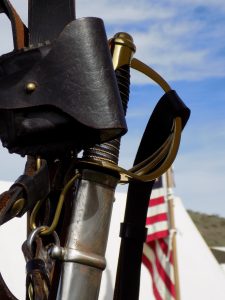The Absalom McGee Family: The Farm becomes a Cavalry Camp during the Overland Campaign

Part 2
The trials of the Absalom McGee Family did not end in 1863 with the battle of Chancellorsville. While Frances and the children tried to put their home back together, Absalom had trailed the retreating Federal army, seeking safety from his own neighbors who hated his Unionist beliefs.
Unfortunately, his plan backfired. Returning home, he was again arrested. (This might have been the time – mentioned in the previous post – when Mrs. McGee had just had a baby and nearly died from the shock of the arrest. The chronology is a little confusing in the testimonies.) No Fredericksburg waiting room or cell this time. They hauled Absalom all the way to Castle Thunder, an infamous prison in Richmond. Once again, Frances McGee begged for her husband’s release, and after about a month, he was allowed to go, after taking an oath not to bear arms against the Confederacy.
Did the irate neighbors actually have good cause for suspecting Absalom? Most likely, yes. The majority of the extended McGee family around Chancellorsville were Unionists. Two of Absalom’s brothers were forced into the Confederate army, but made quick escapes and turned scouts for the Federal army. There was one brother who did join the Rebel army for the duration of the war, but in his post-war testimony, Absalom made it clear he never gave information to that brother, both clearing his name and hinting at the family’s private civil war. Absalom himself was probably giving information to the Union army when he went to their lines and some portions of his testimony suggest that Union cavalry may have stopped by the farm occasionally, likely getting something more valuable than water.
Perhaps knowing about the McGee’s friendliness prompted the arrival of Union horsemen at the beginning of the Overland Campaign:
In 1864 in May Col. Hammond with 500 Cavalry being the advance guard of Gen Grant’s Army in its first advance to the Wilderness camped on the claimant’s farm for days. They took 40 ½ ends of rails for fuel… They pastured 500 horses in a field of clover, containing 30 acres for five days, so that the clover, which was just ready to bloom was eaten close to the ground…
The cavalrymen also took and presumably ate three hogs and three “young cattle.” They also took shovels and axes on permanent loan, leaving plenty for Absalom to include on his list for reimbursement in the 1870s.
The bivouac and feeding of the 500 cavalrymen marks the last period of damages that the McGee family listed when they approached the Claims Commission with a receipt totaling $1,033.00 After approximately 40 pages of testimony and cross-questioning, the commission granted the family $629.50 in total for the damages during the battle of Chancellorsville and the Overland Campaign. Their loyalty had been rewarded in some small way, but there were other aspects of loss and suffering that could not be repaid. That was the family’s sacrifice for the Union cause which had their loyalty and support despite the field hospital and the grazed clover field.
Source:
All quotations and details taken from: Records of the Accounting Officers of the Department of the Treasury, Record Group 217; National Archives at Washington, D.C. Southern Claims Commission Approved Claims, 1871-1880: Virginia. Microfilm Publication M2094, 45 rolls. Absalom McGee file access through Ancestry.com
Thanks for the rich detail allowing the imagination to picture 500 horses enjoying ripe clover in May!
Any relation to the McGee s in Starr sc?